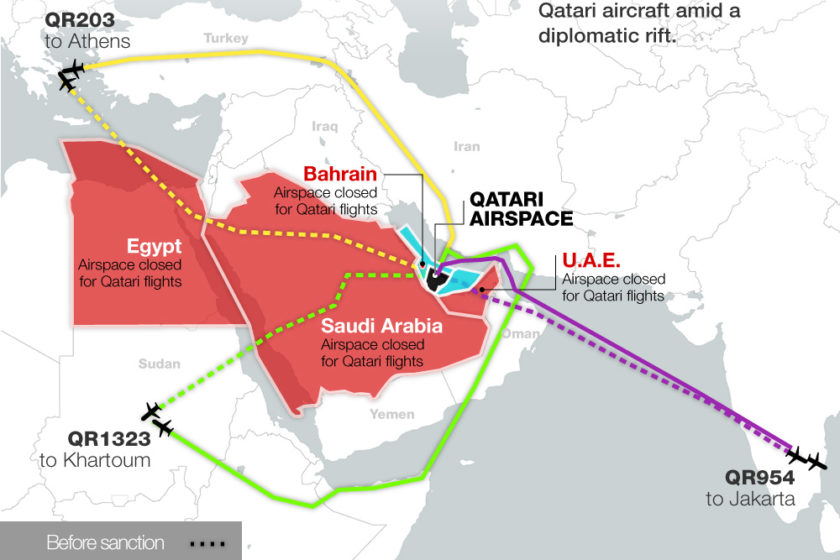October 9, 2018 By The Editor
The Qatar Gulf crisis didn’t blockade Doah’s economy.
The Qatar Gulf crisis generates a variety of results, answers from different countries.
If the intent of the Qatar Gulf crisis was to make Qatari follow in line behind Saudi Arabia and UAE, it failed its purpose.
If the intent was to set Qatar down on its knees, the Qatar Gulf crisis failed its purpose, too.
Nevertheless is gave a powerful demonstration of the bullying power of the Arab countries in the Gulf.
The Qatar Gulf crisis didn’t blockade Doah’s economy.
For starters, the country is simply too wealthy to be pushed around easily. Qatar’s abundant supply of natural gas translates into the highest per capita income in the world.
Even with trade and travel bans imposed by Saudi Arabia, the United Arab Emirates (UAE), Bahrain, and Egypt, Qatar’s economy will not suffer significantly.
Qatar is a popular destination not just because it is the richest country in the world per capita, but because of the relative ease with which visas and work permits can be organised. Also, despite negative media coverage, workers there have relatively better protection now.

Not all the other Arab countries followed in line.
Though the list of countries severing ties is impressive for its unity, equally noteworthy are the omissions. Kuwait and Oman have not followed suit, despite both being members of the Gulf Cooperation Council (which, in addition to Qatar, includes Bahrain, Saudi Arabia, and the UAE). The anti-Qatar bloc could not even persuade its closest allies to follow its lead.
Similarly, while Jordan announced that it would downgrade diplomatic relations, it has offered few details. As long as Qatar can maintain relations with Jordan and Kuwait, the effects of the current campaign are likely to be limited.
A senior Iranian official said the measures by the Arab nations would not help end the crisis in the Middle East. “The era of cutting diplomatic ties and closing borders … is not a way to resolve crisis … As I said before, aggression and occupation will have no result but instability,” Hamid Aboutalebi, deputy chief of staff of Iran’s President Hassan Rouhani, tweeted, referring to the coalition’s involvement in Yemen.
Mevlut Cavusoglu, Turkey’s foreign minister, also called for dialogue to resolve the dispute.
“We see the stability in the Gulf region as our own unity and solidarity,” Cavusoglu told a news conference.
“Countries may of course have some issues, but dialogue must continue under every circumstance for problems to be resolved peacefully. We are saddened by the current picture and will give any support for its normalisation”.
The results of the Qatar Gulf crisis seems quite vary.
Nearly a week later, Qatar appears in no hurry to comply.
Tainting Qatar as a regional pariah is unlikely to change its calculus, for two reasons.
Qatar must also tread lightly with Iran, given their shared ownership of the world’s largest natural gas field, South Pars in the Persian Gulf. Iran has offered to provide the 40% of Qatar’s food supply that it no longer receives from Saudi Arabia as a result of the blockade.
Though there is little risk that Qatar will drift too far into Iran’s orbit.
Kuwait attempting to mediate the current crisis. It is possible that all parties will agree to pull back from the brink in exchange for cosmetic concessions. But it is far more likely that the rift will persist for years, further unraveling a fragmented Middle East.
For more World News, go to our category.
Follow us on our social networks for more updates and other news: official accounts.
Source: Al Jazeera
Pictures by: Pixabay


COMMENTS